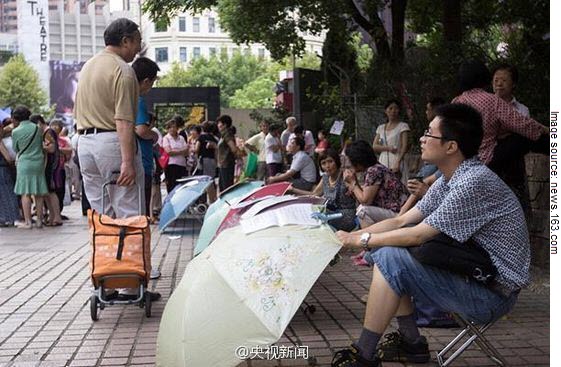5 Useful Words that Describe the Dating Scene in China

From China to the USA, boxes of heart shaped chocolates are already half-finished and bunches of red roses are starting to wilt – February 14th is officially over (phew!).
In last week's Anti-Valentine's Day post, I introduced some of the fun and stress that young Chinese people face during China's hyper-commercialized Valentine’s Day.
This week, I'm introducing expressions that show the intense pressure placed on young Chinese people to find love and get married.
You'll see that money isn't the only thing that makes the dating scene more frightening than fun.
Single dogs and leftover women: essential vocabulary for the unattached

If the cheesiness and monetary drain caused by Valentine’s Day is bad, then being single is even worse. Traditional attitudes of parents and relatives often view an unmarried person in their 30s as an embarrassment at best, and a disaster at worst.
The weight of this burden is so big that the industry for “fake” boyfriends and girlfriends is booming in China. That's right, an unmarried Chinese person can pay a "fake" boyfriend or girlfriend to travel home with them for the holidays.
The following two expressions perfectly illustrate the stresses facing single Chinese people. Use these to complain about being unlucky in love, or commiserate with your single friends.
单身狗 (dān shēn gǒu)  – "single dog"
– "single dog"
This is a mildly insulting term for a single person. You can use it to describe yourself, or poke fun at your close friends.
Come February 14th, my WeChat (China’s version of Facebook) is usually full of friends complaining:
我是单身狗 (wǒ shì dān shēn gǒu) ![]() – I am a single dog.
– I am a single dog.
Note: when several friends are all single, they often take pride in the title 单身狗 (dān shēn gǒu). ![]() "Single and proud!"
"Single and proud!"

Tweet this picture: I'm learning Chinese with @yoyochinese
剩女 (shèng nǚ)  / 剩男 (shèng nán)
/ 剩男 (shèng nán)  – “leftover” woman/man
– “leftover” woman/man
This unfortunate name refers to people in their late 20s or older who aren't married yet.
Given the stigma attached to being above 30 and single, these people are seen as unlikely to find a husband or wife, and are therefore “leftover”.
This term is most often used to apply to educated urban women who prioritize their career above starting a family.
In my adoptive city of Shanghai, people will often comment:
上海剩女越来越多 (shàng hǎi shèng nǚ yuè lái yuè duō) ![]() – There are more and more “leftover women” in Shanghai.
– There are more and more “leftover women” in Shanghai.

Matchmaking, Chinese style
There is a lot of pressure to find a partner. So it’s not surprising that most people in China want to get coupled up—most importantly for the annual trip back home at Chinese New Year (which usually falls in the same month as Valentine’s Day).
The familiar approaches of meeting potential life partners at college, work, or through online dating services are certainly widely used. But the 相亲市场 (xiāng qīn shì chǎng) ![]() – "matchmaking fair" or "marriage market" remains an important, if slightly ruthless, method of finding a spouse.
– "matchmaking fair" or "marriage market" remains an important, if slightly ruthless, method of finding a spouse.
These events can range from a low-key street corner gathering (where parents clutch their children’s credentials and negotiate fervently), to large-scale Expo-style fairs with tens of thousands of attendees.

My local marriage market in People’s Park, Shanghai is a great example of the former.
Parents use umbrellas to display laminated papers outlining their children’s details. Other parents wander the market, taking note of potentially suitable in-laws.
Discussions begin only when parents have established that their potential son or daughter in-law meets their desired income, age, and property-ownership criteria.
When a match is found, parents will arrange for their children to meet. If they hit it off, wedding bells may be ringing within a matter of months.

Although this is a more traditional way of finding a partner, it’s not confined to older people. My friends tell me:
九零后也抢占相亲市场 (jiǔ líng hòu yě qiǎng zhàn xiāng qīn shì chǎng) ![]() – People from the "post-90s generation" also seize (the opportunity of) a marriage market.
– People from the "post-90s generation" also seize (the opportunity of) a marriage market.
Read more about "post-90s generation", DINK-ers, and other Chinese social labels here.
So, what are parents and single people actually looking for in a potential partner?
The following two terms sum it up perfectly:
高富帅 (gāo fù shuài)  – “Mr. Perfect” (lit. “tall, rich, handsome”)
– “Mr. Perfect” (lit. “tall, rich, handsome”)
This guy is well muscled, has above average height, chiseled features, and a full head of hair. He owns an apartment downtown and a nice car. Needless to say, parents are most concerned with the 富 (fù) – "rich" part.
白富美 (bái fù měi)  – "Ms. Perfect" (lit. “fair-skinned, rich, beautiful”)
– "Ms. Perfect" (lit. “fair-skinned, rich, beautiful”)
The female equivalent of “Mr. Perfect” in China is young and slim, with long legs, dainty features, and a pale complexion.
Being wealthy is much less important for a girl, but it still doesn’t hurt.

Tweet this picture: The basic checklist to find Mr. or Ms. Perfect in China.
《我不是高富帅》(wǒ bú shì gāo fù shuài) ![]() – “I’m Not Mr. Perfect”, is actually the name of a Chinese pop song about – yep, you’ve guessed it – a guy struggling to find a girlfriend. (As far as I know, no female version has been recorded yet).
– “I’m Not Mr. Perfect”, is actually the name of a Chinese pop song about – yep, you’ve guessed it – a guy struggling to find a girlfriend. (As far as I know, no female version has been recorded yet).
Given these stringent requirements, it’s not surprising that looking for love brings more stress than joy in China today. So, now you know some of the vocabulary to comfort your "single dog" and "leftover" Chinese friends!
In your country, do parents put similar pressure on people looking for a mate? What other interesting dating and marriage habits have you heard of before? Share them with me in the comments below!
Further reading
Ultimate Vocabulary You Need to Survive (or Avoid) Valentine's Day in China
 PIPPA MORGAN | FEBRUARY 16, 2016
PIPPA MORGAN | FEBRUARY 16, 2016

 Chinese Is Easier Than You Think
Chinese Is Easier Than You Think What Is Pinyin?
What Is Pinyin? An Introduction to the Tones
An Introduction to the Tones The 1st and 2nd Tones
The 1st and 2nd Tones Numbers 0-10
Numbers 0-10 Learn Chinese Pronunciation RIGHT with the (FREE!) Yoyo Chinese Interactive Video & Audio Pinyin Chart
Learn Chinese Pronunciation RIGHT with the (FREE!) Yoyo Chinese Interactive Video & Audio Pinyin Chart [LIVE] How to Read a Chinese Menu 101
[LIVE] How to Read a Chinese Menu 101 [LIVE]: How Chinese People Actually Speak
[LIVE]: How Chinese People Actually Speak Did You Know You Can Use Yoyo Chinese Like a Mobile App?
Did You Know You Can Use Yoyo Chinese Like a Mobile App? Why do non-Chinese people feel that Chinese is difficult to learn?
Why do non-Chinese people feel that Chinese is difficult to learn? An Untold Love Story of Me and Yoyo Chinese
An Untold Love Story of Me and Yoyo Chinese  6 Awesome Authentic Chinese Foods You Need to Know About
6 Awesome Authentic Chinese Foods You Need to Know About Frequently Asked Questions About Chinese
Frequently Asked Questions About Chinese  5 Things Chinese Women Love About Western Men
5 Things Chinese Women Love About Western Men Chinese Insults: How to Name-Call Like a Pro (Part 1)
Chinese Insults: How to Name-Call Like a Pro (Part 1) Tone Pairs - The Mandarin Language Hack You've Been Waiting For
Tone Pairs - The Mandarin Language Hack You've Been Waiting For